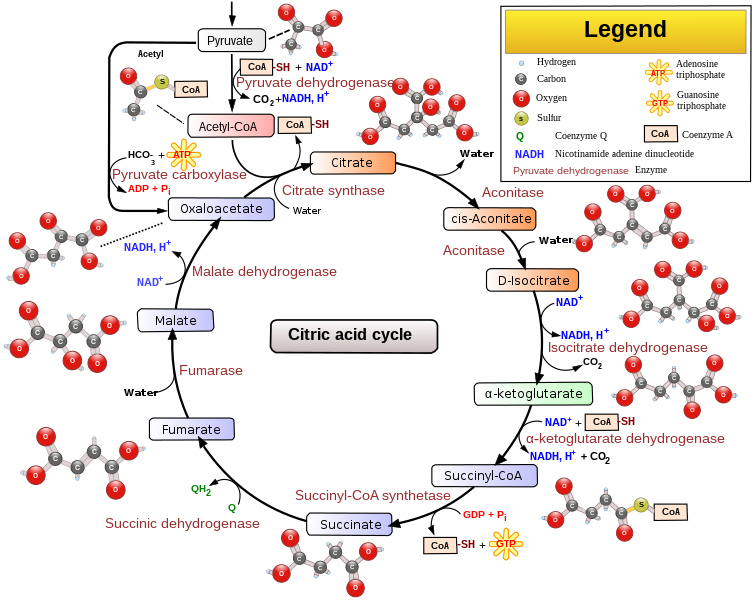I'm happy to say poetry night was a success! Sapo was an amazing act -- almost like some forgotten strain of vaudeville that had evolved in a forest after a hundred years away from outside influences. It was a strange and wonderful honour for our humble poetry group to open for them.
As for my poem, I'm quite happy with it, since it was the culmination of a challenge I'd given myself months ago: Write a poem about the Krebs Cycle.

What a beauty, eh?
Simply put, the Krebs cycle is how the body breaks down glucose to produce energy. It's a vital process, and it manages to be wonderfully efficient and adaptive - in its own special way. The problem is, it's also incredibly confusing, and ill-suited for poetry. But never let it be said I shied away from the challenge!
To make up for the cheesy meter and rhyme scheme, I'll let you know of a few curiosities in the text.
- Most importantly, almost every stage in the cycle is represented by one verse. Each verse has a number of lines equal to the number of carbon atoms involved in that stage. (Glucose breaks down into two three-carbon pyruvate molecules, which is why that verse is repeated.)
- The Krebs Cycle has an anaerobic portion and an aerobic portion. If the body doesn't have time to breathe, it relies solely on the less efficient anaerobic portion. The aerobic portion of the poem is bracketed by the words, "Breathe."
- "Under strain ... drawn and quartered" (Verse 3) refers to the third carbon atom in citrate, which has quaternary substitution, a formation that is very challenging to work with in the laboratory. (Warning: link is TOO safe for work.) It would surprise nary a single chemist that the first thing the Krebs Cycle does with citrate is convert it to isocitrate, which has only a tertiary substituted carbon.
- "double braced and inflexible" (Verse 7) refers to fumarate, the only molecule here with a double bond - and they are indeed inflexible. If a molecule of water is added to those carbons, it becomes a single bond which can rotate freely. (Verse 8, line 3)
- The line about the alpha male refers α-ketoglutarate, because I can't find a rhyme for α-ketoglutarate.
- I can, however, find partial rhymes for "Succinyl CoA" and "Succinate", and I mention an ox and ass eating at the end to represent "oxaloacetate". Good enough, says I.
And so forth. The only other observation I'd like to make is that much to my surprise, a cell's production of energy is (metaphorically) rather similar to a society's production of buildings. Does this mean buildings have to be "spent"? Or are they spent, in a way that doesn't require their destruction? An interesting question to ponder some other day.
But for now... here's the poem!
THE KREBS CYCLEby Denton Froese(1) There's not enough timeThere's too much demandThe matters at hand are pushing the lineThere's not enough timeThere's too much demandThe matters at hand are pushing the lineBreathe.(2) These problems have been solved beforelisten to the future's needscycles rise upon the shoreand fall into the endless seasaccept the aid and join the coreof vast and mighty entities.(3) It's hard to perceive the view from a cornerlinks aren't visible, only the chainstability comes with a bit of reorderto help and to be helped requires a changetwisted in knots, drawn and then quarteredshift under the weight, relieving the strain(4) Amputation brings extensionthe alpha male sends out its packbid farewell to what you treasuredthe bridge is stronger, mind the gapemptiness brings satiation(5) The divine will go pray to rejoin the flocksthe towers rise, the city spreadsthe trees shall grow with what is lostfrom the huddled outward breath.(6) With all this time in flux, the waitpays off for those trapped in the massthe old designs regenerateand shout against the stagnant past(7) Built for strength, a mighty fortressdoubly braced to waves and windsinflexible in times of stressor when smoke curls from within(8) Submerge, dissolve, expand, forgetdance to the music of orbital spheresturn freely and don't be afraid to get wettake in the view as the ending draws near(9) The ox pulls the yoke, encircling the fieldback to the spot where the first seeds were sownthe ass eats some grain from the previous yieldand then back to work for the next journey home.Breathe.
And there you have it! I hope you liked at least some part of this little bit of singsong doggerel... and who knows? Maybe now that I've gotten this out of my system, my next poem will feature some sort of emotion!
It will be my greatest challenge yet.
(p.s. The line "amputation brings extension" is actually taken from one of Marshall McLuhan's books. Apparently, I felt this poem wasn't academic enough.)
3 comments:
And now you have to add this poem to your next NaNoNovel and/or make a song out of it! After all, a song is just a poem with a tune. :)
Oh, very nicely done.
Great post! Read more about Kreb Cycle. This post is linked there.
Post a Comment